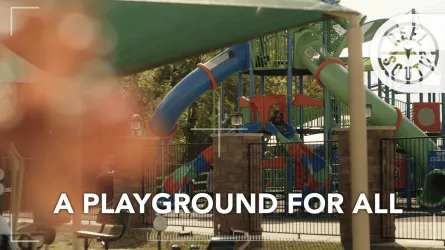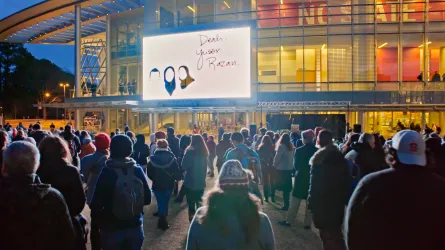"F11 and Be There" is a commentary on American civil rights, race, social justice, and art, told through the many lenses of legendary Life and Magnum photographer Burk Uzzle. Texas-born and North Carolina-raised filmmaker Jethro Waters captured Uzzle's career through the documentary. Reel South connected with Waters to get insight into his film before it premieres on the series' fifth season.
The interview has been edited and condensed for clarity.
What inspired you to make your film?
Making "F11 and Be There" felt more like the intervention of destiny, rather than any specific choice. I was born in Austin, Texas and my family relocated to rural North Carolina when I was 11. I started taking photographs not long after that. The years I spent as a young person photographing the south in 35mm have forever influenced the way I see the world. Burk Uzzle is a North Carolina native and so we both relate to the South, with its conflicting identities, eccentricities, all the good and the bad, in the very same ways. Our shared passion for the medium of photography, storytelling through images, art, biscuits, grits, red-eye gravy, and so many other similarities, for me, made it seem like meeting a long lost brother, rather than the subject of a film. During our first conversation in the Ackland Art Museum in Chapel Hill, N.C., when I fully understood the scope of Burk’s life, legacy, talent, and humanity, I knew immediately this was a profound story for a film. I felt as though, even from the start, the relevance of what we were doing was very important, from a social, political, and historic standpoint – given that Burk has been so involved in Civil Rights and social justice since the 1960s. We began filming in September of 2016. Very quickly the socio-political climate in the U.S. changed dramatically and we realized that now, more than ever, Burk’s story is a very important one to tell.
How did you get connected to your subject?
A mutual friend introduced Burk and I. I’ve been marveling at Uzzle's photography my whole life, though I never had any idea he was living just a few hours away from my home in North Carolina.
Were there any parts you wish you could have included in the film?
We took a road trip together across the United States for the film. In a high school in Utah, we stumbled upon a biology classroom with hundreds of taxidermied animals spread across every wall and empty space. Burk spent around six hours composing and lighting all his favorite animals from the room into a single photo. It is such fantastically strange and wonderful footage, and of course, he produced a marvelous picture from that shoot, but I ended up cutting the scene for time.
Were there parts with very interesting backstories that weren't totally relayed in the final film?
For the film, I interviewed Steve McCurry, the photographer who took the very famous picture that we all know called “Afghan Girl” which has appeared on the cover of National Geographic. Steve told me a story about the first time he met Burk Uzzle, which was in Vietnam in the 1970s. Steve was a young, unknown photographer, and owned copies of all of Burk’s photography books, which he had studied endlessly. Steve expressed that Burk was something of a hero to him. At the time when they met, Burk was leaving Vietnam for America, while Steve was on his way for the first time to Afghanistan (where he would later shoot the Afghan Girl picture). Steve was all out of film, so Burk gave him all the rest of the Kodachrome 35mm film he had brought on the trip. Then Steve traveled to Afghanistan for the first time with a pile of Kodachrome given to him by his photography hero. What a life-changing experience that must have been.
What do you hope people learn/hope they take away from your film?
There is such a range of universally important and timely messages within Burk’s work. Some that are in specific focus within the film: equality, civil rights, social justice, honoring the humanity in everyone, artistic sacrifice, the perils of our modern civilization, among others. In our ever-fracturing American society, we must pay close attention to folks like Burk, who have dedicated their lives to uplifting other human beings. The film is also a love letter to hard work and craft. I think most people appreciate photography in some form, and I hope "F11 and Be There" offers people a deeper understanding of how important and wonderful photography is, especially when it is wielded by someone as talented as Burk.
Is there anything else you'd like to share with the Reel South audience?
We have to respect each other. We have to help each other. Our world is not a world comprised of individuals. Rather, we live in a world of communities. We all rely on each other. One hand washes the other, as the saying goes. And as a nation, we have to acknowledge that racism, hatred, bigotry, and intolerance are such terribly persistent parts of American life. These things are the great destroyers of our society. And we all have a duty to face these problems as a community and to try our best to fix them.
What advice would you give other filmmakers or others interested in documentary film?
There are no rules. Well, maybe there is one rule: a great story. If you find that, or even just the very first piece of a great story, the rest will sort itself out as you go. In the end, make the film that you want to make, and make it how you want to make it.
Can you complete this sentence: "What defines you…"
What defines you are the actions you take. A person’s true nature is not defined by what that person says. The true nature of a person is defined by what that person does.
Category
Share


